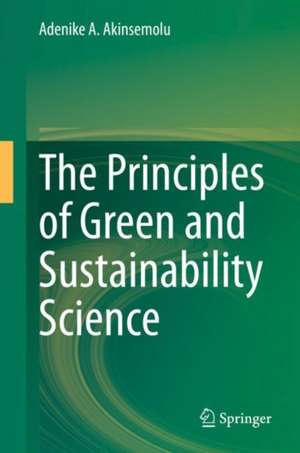The Principles of Green and Sustainability Science
Autor Adenike A. Akinsemoluen Limba Engleză Paperback – 29 mar 2021
The book pursues a scientific approach, and uses scientific evidence as the basis for achieving sustainability. The key topics addressed include: unemployment, health and disease, unsustainable production, our common future, renewable energies, waste management, environmental ethics, and harmful anthropogenic activities.
Whereas past literature has mainly examined sustainability as an environmental issue, this book expands the conversation into various sciences, including mathematics, biology, agriculture, computer science, engineering, and physics, and shows how sustainability could be achieved by uniting these fields. It offers a wealth of information across various disciplines, making it not only an intriguing read but also informative and insightful.
| Toate formatele și edițiile | Preț | Express |
|---|---|---|
| Paperback (1) | 579.72 lei 38-44 zile | |
| Springer Nature Singapore – 29 mar 2021 | 579.72 lei 38-44 zile | |
| Hardback (1) | 651.51 lei 3-5 săpt. | |
| Springer Nature Singapore – 29 mar 2020 | 651.51 lei 3-5 săpt. |
Preț: 579.72 lei
Preț vechi: 724.65 lei
-20% Nou
Puncte Express: 870
Preț estimativ în valută:
110.94€ • 114.61$ • 92.33£
110.94€ • 114.61$ • 92.33£
Carte tipărită la comandă
Livrare economică 21-27 martie
Preluare comenzi: 021 569.72.76
Specificații
ISBN-13: 9789811524950
ISBN-10: 9811524955
Pagini: 407
Ilustrații: XXIX, 407 p. 83 illus., 73 illus. in color.
Dimensiuni: 155 x 235 x 27 mm
Greutate: 0.73 kg
Ediția:1st ed. 2020
Editura: Springer Nature Singapore
Colecția Springer
Locul publicării:Singapore, Singapore
ISBN-10: 9811524955
Pagini: 407
Ilustrații: XXIX, 407 p. 83 illus., 73 illus. in color.
Dimensiuni: 155 x 235 x 27 mm
Greutate: 0.73 kg
Ediția:1st ed. 2020
Editura: Springer Nature Singapore
Colecția Springer
Locul publicării:Singapore, Singapore
Cuprins
Part 1. Introductory Context and Principles of Green.- Chapter 1. The Principles of Green.- Chapter 2. Basic Ecology.- Chapter 3. Everyday Activities in the Green World.- Chapter 4. Effects of Everyday Activities on the Ecosystem.- Part 2. Green Practices and Environmental Responsibility.- Chapter 5. Health and Diseases.- Chapter 6. Renewable Energy.- Chapter 7. Water and Wastewater Treatment.- Chapter 8. Waste Management.- Chapter 9. Environmental Ethics.- Part 3. Principles and Practices of Sustainability.- Chapter 10. Sustainability.- Chapter 11. Green Entrepreneurship.- Chapter 12. Sustainability in Science.- Chapter 13. The Future: Achieving Sustainability
Notă biografică
Adenike A. Akinsemolu is the founder of the Green Institute, a leading and multiple award-winning research institution in Nigeria dedicated to the broad sustainability discourse, and to training leaders who will systematically transform attitudes about environmentalism in Africa. She holds a Ph.D. in Environmental Microbiology and a Postgraduate Diploma in Education.
Textul de pe ultima copertă
This book uses the concept of sustainability in science to address problems afflicting the environment, and to devise measures for improving economies, societies, behaviors, and people.
The book pursues a scientific approach, and uses scientific evidence as the basis for achieving sustainability. The key topics addressed include: unemployment, health and disease, unsustainable production, our common future, renewable energies, waste management, environmental ethics, and harmful anthropogenic activities.
Whereas past literature has mainly examined sustainability as an environmental issue, this book expands the conversation into various sciences, including mathematics, biology, agriculture, computer science, engineering, and physics, and shows how sustainability could be achieved by uniting these fields. It offers a wealth of information across various disciplines, making it not only an intriguing read but also informative and insightful.
The book pursues a scientific approach, and uses scientific evidence as the basis for achieving sustainability. The key topics addressed include: unemployment, health and disease, unsustainable production, our common future, renewable energies, waste management, environmental ethics, and harmful anthropogenic activities.
Whereas past literature has mainly examined sustainability as an environmental issue, this book expands the conversation into various sciences, including mathematics, biology, agriculture, computer science, engineering, and physics, and shows how sustainability could be achieved by uniting these fields. It offers a wealth of information across various disciplines, making it not only an intriguing read but also informative and insightful.
Caracteristici
Focuses on the principles of green and sustainability science using various case studies Contributes to literature in the science and environmental field by providing information on the scientific aspects of sustainability Offers extensive information on viable solutions for the problems besetting our societies, especially the environment and unemployment Draws on insights from many experts with a diverse range of backgrounds in sustainability The first text to deal exclusively with sustainability issues in Africa
